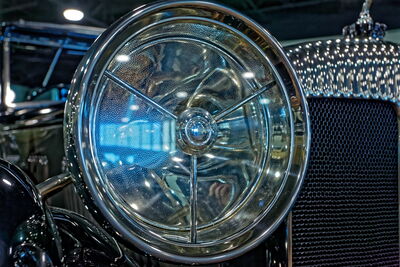Cars catching fire
Aug 28, 2022 11:51:32 #
A friend’s F-150 recently self-combusted in his driveway (which had not been driven in the last few hours). Luckily it was far enough from their house not to catch it on fire as well, but the vehicle was thoroughly totaled. The fire seemed to have originated near the speed control “module”, and the fire chief on scene said he had seen this happen more than once. That was news to me since there are zillions of F-150s on the road and I had never heard of self-immolation issues. That caused me to Google which vehicles catch fire the most (and it’s not Ford trucks), but I did pick up one tidbit from Car and Driver this year which I found interesting and not what I would have initially suspected:
“ It found that hybrid vehicles, which have an internal combustion engine and an electric motor, had the most fires per 100,000 vehicles (3475), while vehicles with just an internal combustion engine placed second (1530 per 100,000). Fully electric vehicles had the fewest: 25 per 100,000.”
“ It found that hybrid vehicles, which have an internal combustion engine and an electric motor, had the most fires per 100,000 vehicles (3475), while vehicles with just an internal combustion engine placed second (1530 per 100,000). Fully electric vehicles had the fewest: 25 per 100,000.”
Aug 28, 2022 11:53:55 #
Aug 28, 2022 11:55:33 #
Susan yamakawa wrote:
Another reason not to have one
Not to have one what? Cars? F-150s? Hybrids?
Aug 28, 2022 12:01:22 #
Aug 28, 2022 12:04:42 #
Abo wrote:
If logic and reason prevails, Hybrid.
Interesting (but not unexpected) that fully electric are so low, but after seeing a LiPo fire up close, I bet they are a nightmare to extinguish.
Aug 28, 2022 12:15:56 #
Tigger1
Loc: Surrey, BC Canada
TriX wrote:
Interesting (but not unexpected) that fully electric are so low, but after seeing a LiPo fire up close, I bet they are a nightmare to extinguish.
LiPo (Lithium Polymer) batteries similar to those used in Tesla cars can be problematic for fire departments to extinguish. LiFePO4 (Lithium Iron Phosphate) batteries such as those used in Ford F150 and other model cars are not subject to self-emolation. LiFePO4 battery technology is safer for mobile uses where the risk of fire may be present.
Aug 28, 2022 12:56:42 #
Aug 28, 2022 13:31:24 #
TriX wrote:
A friend’s F-150 recently self-combusted in his dr... (show quote)
You didn't state the year of the F-150 but my 2001 model year had a fire risk (even when not powered up) caused by a short circuit in the cruise control disconnect switch attached to the brake master cylinder. The fix was a new switch and a fuse attached to the switch in case it too shorted out.
What I could never understand was why that switch was hot (powered) all the time - running or parked. Seems strange to me that the cruise control disconnect switch needed to be powered up even when the vehicle was parked.
Aug 28, 2022 13:34:16 #
Transitioning from where we are now to whatever future personal forms of transportation, we finally settle upon isn't going to be all that logical, easy, and for sure inexpensive -- -
There will always be bicycles & shoe leather
I'm hoping for Hydrogen Fuel Cells -
There will always be bicycles & shoe leather
I'm hoping for Hydrogen Fuel Cells -
Aug 28, 2022 14:00:53 #
fredpnm wrote:
You didn't state the year of the F-150 but my 2001... (show quote)
I don’t know the exact year of F-150, but similar to yours, and the fire originated in the same place as yours. No clue why the cruise control aould be powered up when the vehicle was off.
Aug 29, 2022 05:49:19 #
TriX wrote:
A friend’s F-150 recently self-combusted in his dr... (show quote)
As I recall Ford did have a problem with this in the late 1990's early 2000's , but I don't remember which models.
Aug 29, 2022 05:52:40 #
fredpnm wrote:
You didn't state the year of the F-150 but my 2001... (show quote)
So your brake lights will work without the ignition being on!!
Aug 29, 2022 06:14:26 #
Batteries are commonplace today in nearly every item we use. However, few people have an understanding of how much energy is contained in these batteries. In industrial safety, caution is always advised when using or working around any device that stores energy. This includes heavy-duty springs, hydraulic systems, compressed air systems, high-pressure water systems, and especially batteries. If the energy in any of these systems is inadvertently released in an uncontrolled manner, serious damage or injuries is possible.
Batteries are the most common system that people often encounter on a regular basis. An average home has numerous batteries around the house. A home may have several laptops, tablets, cell phones, backup battery systems (UPS), and often, cars in the garage. Homes with solar panels will have even more batteries capable of storing high energy levels.
The normal car battery of a gas or diesel engine has a tremendous amount of energy stored within. Most cars and trucks have complex wiring harnesses throughout the vehicle powering and controlling various systems. Wires can be damaged during assembly, maintenance, or even through wear and tear in normal use. A short anywhere in these wiring harnesses could cause a fire.
People are surprised and shocked when they read about or experience electrical fires. As we become more mobile, more and more batteries are being used in more devices. These batteries are also becoming more powerful, packing more energy into smaller and smaller packages. As an electrical engineer, I am surprised there are not more fires than are reported.
Batteries are the most common system that people often encounter on a regular basis. An average home has numerous batteries around the house. A home may have several laptops, tablets, cell phones, backup battery systems (UPS), and often, cars in the garage. Homes with solar panels will have even more batteries capable of storing high energy levels.
The normal car battery of a gas or diesel engine has a tremendous amount of energy stored within. Most cars and trucks have complex wiring harnesses throughout the vehicle powering and controlling various systems. Wires can be damaged during assembly, maintenance, or even through wear and tear in normal use. A short anywhere in these wiring harnesses could cause a fire.
People are surprised and shocked when they read about or experience electrical fires. As we become more mobile, more and more batteries are being used in more devices. These batteries are also becoming more powerful, packing more energy into smaller and smaller packages. As an electrical engineer, I am surprised there are not more fires than are reported.
Aug 29, 2022 06:52:14 #
TriX wrote:
I don’t know the exact year of F-150, but similar to yours, and the fire originated in the same place as yours. No clue why the cruise control aould be powered up when the vehicle was off.
It probably saved a buck or two while making them - remember the Pinto?
Aug 29, 2022 07:12:48 #
avflinsch wrote:
It probably saved a buck or two while making them - remember the Pinto?
you forgot the Mustang, the Falcon the Fairlane, the Mercury Cougar they all used the same type of fuel tank, it mounter ridged and served as the trunk floor, the tank could not move causing it To rupture in a very minor rear end collision !
If you want to reply, then register here. Registration is free and your account is created instantly, so you can post right away.







